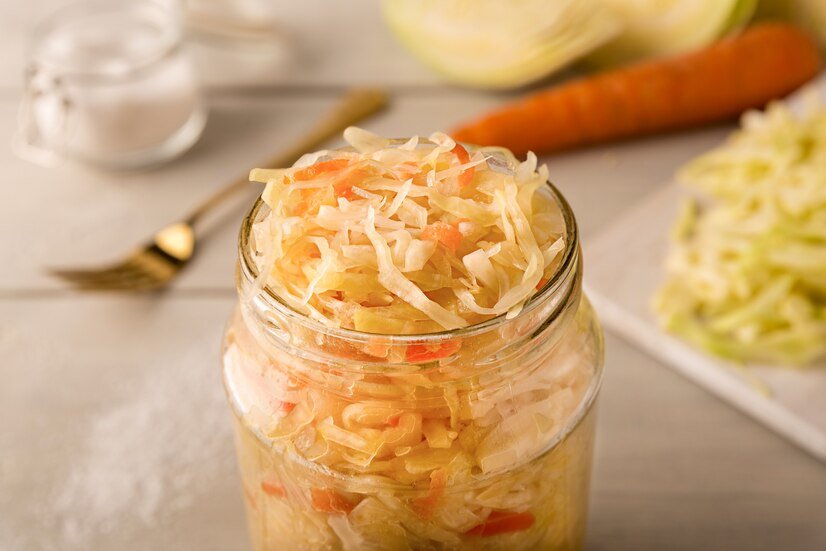
[adinserter block=”3″]
Sauerkraut has gained huge attention over the past few years as a famous side dish and seasoning food in many countries. It is considered a “national dish” of Germany as the name “Sauerkraut” is the German term where ” “Sauer” means sour and “Kraut” is called cabbage. Basically, Sauerkraut is a dish prepared using cabbage that undergoes lacto-fermentation which gives a spicy flavor. This process extends the shelf-life of the food and preserves its effectiveness. In terms of health, now, you might be wondering, “Is sauerkraut good for you?” Typically, it is healthy for you as the fermentation process it undergoes enhances the nutritional value of the sauerkraut which benefits your health a lot beyond the fresh cabbage. It makes a good contribution to heart health, bone health, immune health, chronic inflammation, anxiety, and cancer risk. Let’s directly explore the article to know how good is sauerkraut for you and how to make and use it for effective health benefits.
What Is Sauerkraut?
Sauerkraut which is also known as “sour cabbage” is a type of fermented cabbage that is made using spices and salt that gives it a sour flavor. It is frequently consumed as a national dish in Germany but is also famous in the United States and other Asian and European countries. However, the root origin of this unique dish is China where the fermentation method was utilized to preserve foods and avoid quick spoiling. Take a look and know the uniqueness of this dish:
- Sauerkraut is prepared using fresh, organic cabbages, which are fermented for many months with the use of salt brine.
- At the time of fermentation, the yeast and bacteria cells naturally found in the organic cabbages break down the carbs present in them and produce lactic acid.
- To prepare this nutritious dish, no heat is used as it destroys all the good bacteria that are required for fermentation.
Wondering what does sauerkraut taste like? Sauerkraut or we can say fermented cabbages which are rich in lactic acid have a delicious sour taste. It is a probiotic food that is rich in vitamins, minerals, and lactic acid.
Nutritional Profile of Sauerkraut
In 50 grams of sauerkraut, you can get the following nutrients:
- 0.6 g Protein
- 5 mg Vitamin C
- 0.6 g Carbohydrates
- 4 kcal / 18 KJ Calorie
- 90 mg Potassium
- 1.5 g Fiber
- 0.74 g Salt
- 25 mg Calcium
- 0.0 g Fat
Is Sauerkraut Good For You?
Yes, sauerkraut is good for you because of its rich nutritional profile which is loaded with vitamins, fiber, protein, carbohydrates, potassium, and calcium. These nutrients make it beneficial for your good health and overall well-being. The following are the potential benefits it provides:
1. Improve Digestion
Research says, your gut consists of about 38 trillion bacteria which is more than body cells (around 30 trillion). These potent bacteria have an important role in your digestive system. Here, fermented food items like unpasteurized sauerkraut facilitate healthy gut bacteria. It consists of probiotic bacteria which fights against harmful bacteria and toxins. Moreover, one study says, probiotic bacteria can also prevent diarrhea that is associated with antibiotic usage. Besides this, a variety of probiotic strains may give different benefits and according to another study, 1 serving of nutritional sauerkraut provides 28 distinctive bacterial strains. These multiple strains help improve gut integrity, reduce bloating and gas, improve nutrient absorption, and defend against antibiotic resistance. Sauerkraut is also rich in many enzymes, helping in the breakdown of potent nutrients into small and smoothly digestible molecules that ease their absorption.
2. Strengthen Immune System
Research says sauerkraut is highly rich in probiotics and some potential nutrients which have a strong impact on the immune system. The probiotics present in sauerkraut may enhance the balance of good gut bacteria which can contribute to healthy gut lining. A strong gut lining plays a key role in controlling unwanted substances from entering your body and inducing an immune response. Moreover, maintaining good bacteria in the gut also contributes to the reduction of harmful bacterial growth and the production of potent antibodies, protecting the body from unwanted substances. Furthermore, sauerkraut may also decrease the chances of certain infections such as urinary tract infections and the common cold. Most importantly, as this nutritious fermented food is packed with iron and vitamin C, both nutrients benefit the immune system by sustaining the immune function and balancing free radicals (as excess can damage cells) simultaneously.
3. Support Heart Health
The nutritious sauerkraut can effectively contribute to a healthy heart and its nutritional profile plays a major role here. This fermented food is highly rich in probiotics, fiber, vitamins, and potassium. According to a study, the good content of Lactobacillus plantarum probiotic strains found in sauerkraut is beneficial in reducing the levels of bad cholesterol which is a risk factor for heart disease. Fiber in it also maintains healthy cholesterol levels. Being a great source of potassium and also probiotics, this fermented food item may reduce the blood pressure levels in people struggling with hypertension, another cause of heart problems. The uniqueness of sauerkraut is its vitamin K2 content which prevents the accumulation of calcium deposits in the heart arteries that can lead to atherosclerosis (a condition marked by plaque buildup in the inner artery’s lining, causing thickening of arteries). By preventing this condition from occurring, vitamin K2 can lower the chances of heart disorders.
4. Help Lose Weight
Adding sauerkraut to your daily diet can help cut down excess body fat and maintain a healthy body weight. This is because this fermented food is significantly rich in fiber and low in calories. Study says fiber can prevent cravings often by keeping you full for a longer period, also helping you decrease your everyday calorie intake. Besides this, the good amount of soluble fiber in sauerkraut significantly lowers the appetite and balances the needed bacteria in the gut. Moreover, the probiotics found in this food also contribute to shedding off the waist fat. The exact reason is not clear but some experts believe that probiotics can reduce the accumulated fat, absorbed from the regular diet. However, more studies are needed to conclude its effectiveness in weight loss.
5. Reduce Certain Cancer Risks
Loaded with antioxidants and many nutritious plant compounds, sauerkraut may reduce certain cancer risks. The fermentation procedure of sauerkraut might also produce some potent plant compounds that block precancerous cells’ growth. A study says some Polish immigrants in the USA found that more sauerkraut consumption effectively lowers the risk of breast cancer. The beneficial sauerkraut compounds may protect against certain types of cancer such as colon cancer, prostate cancer, liver cancer, pancreatic cancer, and gastrointestinal cancer. However, the studies are limited and not all of them provide the same outcomes. Hence, more research is required for the final conclusion.
Note: If you choose store-bought sauerkraut, be aware that many brands undergo pasteurization to expand the products’ shelf-life which kills the valuable bacteria. Also, some make use of certain preservatives that can lower the probiotic content. So, always look for the ‘unpasteurized’ products or go for homemade sauerkraut as they are organic and free of preservatives. Want to know how to prepare the home-baked delicious sauerkraut? The below section explains all the steps!
How To Make Sauerkraut?
Well, making fresh and mouth-watering sauerkraut at home involves an inexpensive and easy method. It is prepared using an acidic salt brine that preserves the nutritional value of sauerkraut and increases its shelf-life through a process called Lacto fermentation. During the initial stage of fermentation, bacteria act upon the fresh cabbage which turns out to produce lactic acid and carbon dioxide. In a highly acidic environment, bacteria fail to survive and further die. The Lactobacillus bacteria present in cabbage replace those bacteria to properly manage this extremely acidic condition. Then, the cabbage undergoes more fermentation in the left sugar water (found in brine) which makes it highly rich in lactic acid. The process continues till the entire mixture does not reach the pH level of around 3. When the fermentation stops, your sauerkraut is ready to enhance your taste buds and improve your health. Let’s know how sauerkraut is made:
Ingredients:
- 1 small green, organic cabbage
- 1 tablespoon fine chopped garlic
- 1 tablespoon salt
- 3 sliced carrots
- A large glass jar of one liter to keep sauerkraut, one small jar to keep over the large jar, and a weighing machine for measuring the mixture of cabbage.
Method:
- Take finely chopped garlic and sliced carrots in a big bowl.
- Take the outer cabbage leaves and finely chop them.
- Add the chopped cabbage to the large bowl of garlic and carrot mixture.
- Sprinkle some salt over it and mix it gently for about 2 to 3 minutes till the brine (salt water) starts setting down at the bowl bottom.
- Now keep this mixture in a glass jar and press it well to get rid of air pockets. Pour the left brine into the jar. Make sure the mixture is properly immersed as trapped air can lead to the growth of toxins or harmful bacteria.
- Cut the leaves of cabbage according to the jar opening size to prevent them from resting on the surface.
- Put a small glass jar with no lid inside the large one on the top portion of the cabbage mixture. This will help keep the entire mixture below the brine.
- Ensure the lid of the larger glass jar is a little loose as it lets the gas escape throughout the process of fermentation.
- Put the jar at room temperature with no direct sunlight for about 1 to 4 weeks. Your sauerkraut is ready!
What To Eat With Sauerkraut?
Fermented sauerkraut is eaten as a snack, a side dish, and sometimes as a condiment to enhance the flavor of different types of cuisines. The following are some of the food you can eat with sauerkraut:
- Add a full tablespoon of delicious sauerkraut as a side food with scrambled eggs, omelets, or breakfast sausages.
- Use it as a raw topping with sandwiches, green salads, and wraps.
- Enjoy it on the side with veggies, rice, chicken, and baked potatoes.
- Add it to prepare veggie burgers, hot dogs, turkey burgers, and hamburgers.
- Replace raw cabbage in chicken and fish tacos with sauerkraut.
- Use the sauerkraut as a salty, savory dip to enjoy the chips.
- Spread the sauerkraut on the top of the avocado toast to enhance the flavor and texture.
Make sure to consume sauerkraut in moderate amounts. 75g of nutritious sauerkraut a day is enough to get the potential health benefits. Remember that excess use can lead to some side effects such as constipation, intestinal gas, diarrhea, itchy skin, bloating, and headache. If you have a sensitive gut, avoid having it in large quantities as there can be a risk of abdominal cramps. Moreover, people with kidney and high blood pressure issues should not consume it as it contains a high content of salt.
Summing Up
This article addressed one of the most sought-after questions associated with Sauerkraut- Is Sauerkraut Good For You? We learned it is an incredible source of potential probiotics and several other essential nutrients that deliver the maximum health benefits when consumed in moderate amounts. Being packed with protein, vitamins C, B6, and K, potassium, fiber, zinc, and iron, it can be eaten to maintain great health and overall well-being. From improving digestion and heart health to supporting weight loss and the immune system, this fermented food can be very healthful. It is available in stores as well and you can prepare it at home. This delicious food can be used as a snack or side dish with breakfast sausages, chicken, green veggies, scrambled eggs, and a topping with sandwiches, wraps, and green salads.
Frequently Asked Questions
Can you freeze sauerkraut?
No, you can not freeze sauerkraut as the freezer’s extreme temperature can eliminate its probiotic content, making it not much healthy to eat.
Does sauerkraut go bad?
No, sauerkraut does not go bad for 4-6 months if you’re refrigerating it. Make sure to seal it after every use as trapped air can cause bacterial growth, spoiling the food.
What is sauerkraut made of?
Sauerkraut is prepared using cabbage mixed with salt which undergoes fermentation.
How long is sauerkraut good for?
If refrigerated, sauerkraut is good for about 4-6 months after you start using it. Always seal it properly as air can trap inside, causing the growth of bacteria which can spoil the entire food.
Is sauerkraut healthy?
Yes, sauerkraut is healthy as it is rich in vital nutrients such as vitamins, protein, fiber, and certain minerals, contributing to heart health, immune function, bone health, and weight loss. Its probiotic bacteria help improve gut health.
Is sauerkraut a probiotic?
Sauerkraut is a great source of probiotics which balances the gut bacteria, improving your gut lining.
Does sauerkraut cause gas?
Yes, sauerkraut causes gas due to the compound called trisaccharide raffinose found in cabbage. Small intestines are unable to digest this compound, leading to some discomfort.
What is sauerkraut good for?
Sauerkraut is good for gut health, immune function, bone health, heart health, and weight loss.
[adinserter block=”3″]
Credit : Source Post






